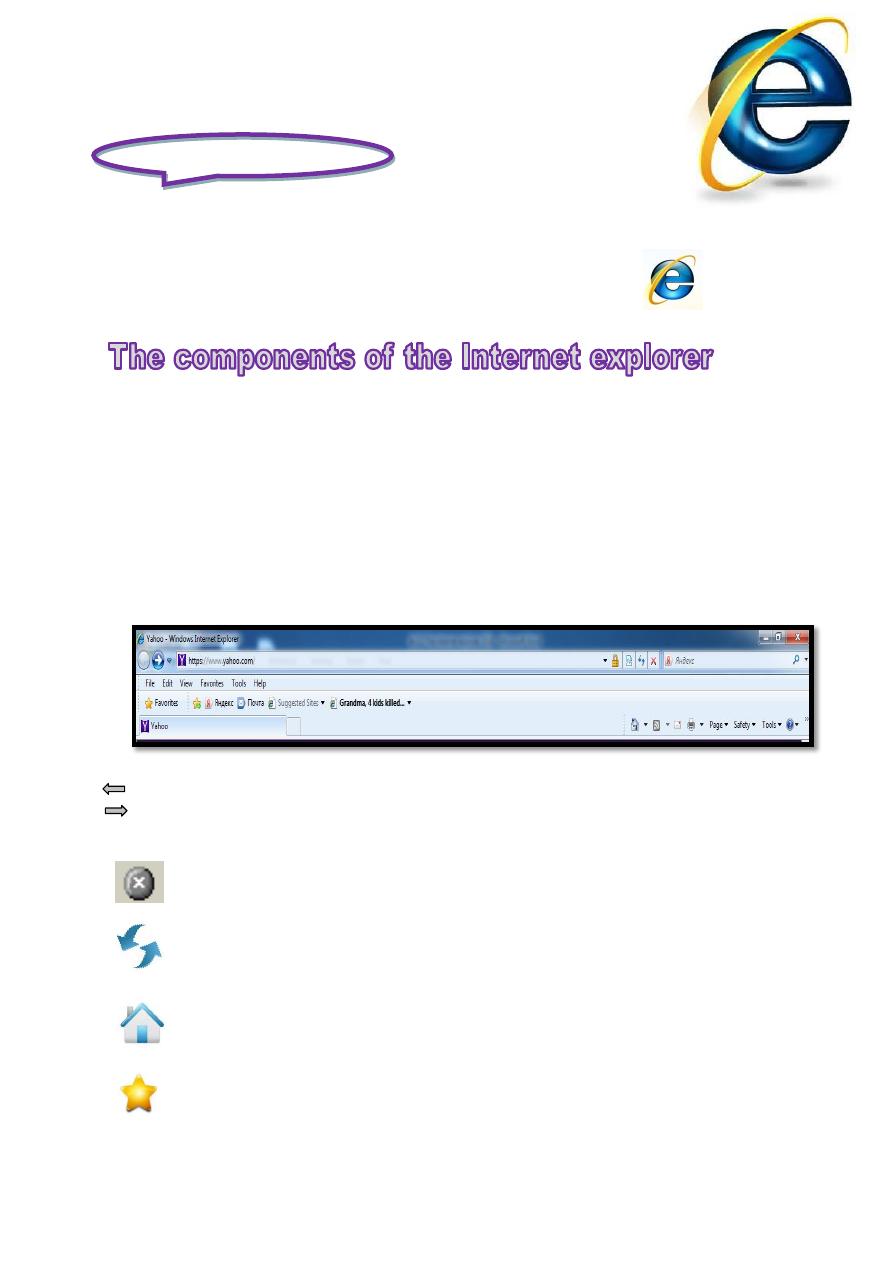
First stage – College of Medicine – University of Mosul \
Nineveh
Computer-Lecture 12 / 2015-2016
Maha al ani
1
Starting Internet explorer
The Internet explorer is the application that displays the
web pages from the Internet. Like all windows programs, the Internet explorer
can be started in many ways:
Click the internet explorer icon on the desktop window
Start > programs > internet explorer
Title bar : appears at the top of the screen contains the title of current
web page or file which is on display in internet explorer
Address bar: display the page address (URL) for the current web site. And
The Address Box allows you to go directly to a site on the Internet.
Menu bar: has several sub-menus that you can use to control the way
internet explorer works
Tool bar: it is a group of buttons you can click to run frequently.
Back: Takes you to the last page you were viewing
Forward: displays the page you were viewing before you went
back to the current page.
Stop: cancel the attempt to connect to a page or document.
Refresh: reloads a fresh copy of the current page you are viewing.
Home: return to the designated home page that was setup as the
default
Start-up page for Internet explorer.
Display the list of Favorites (same as Favorites Menu).
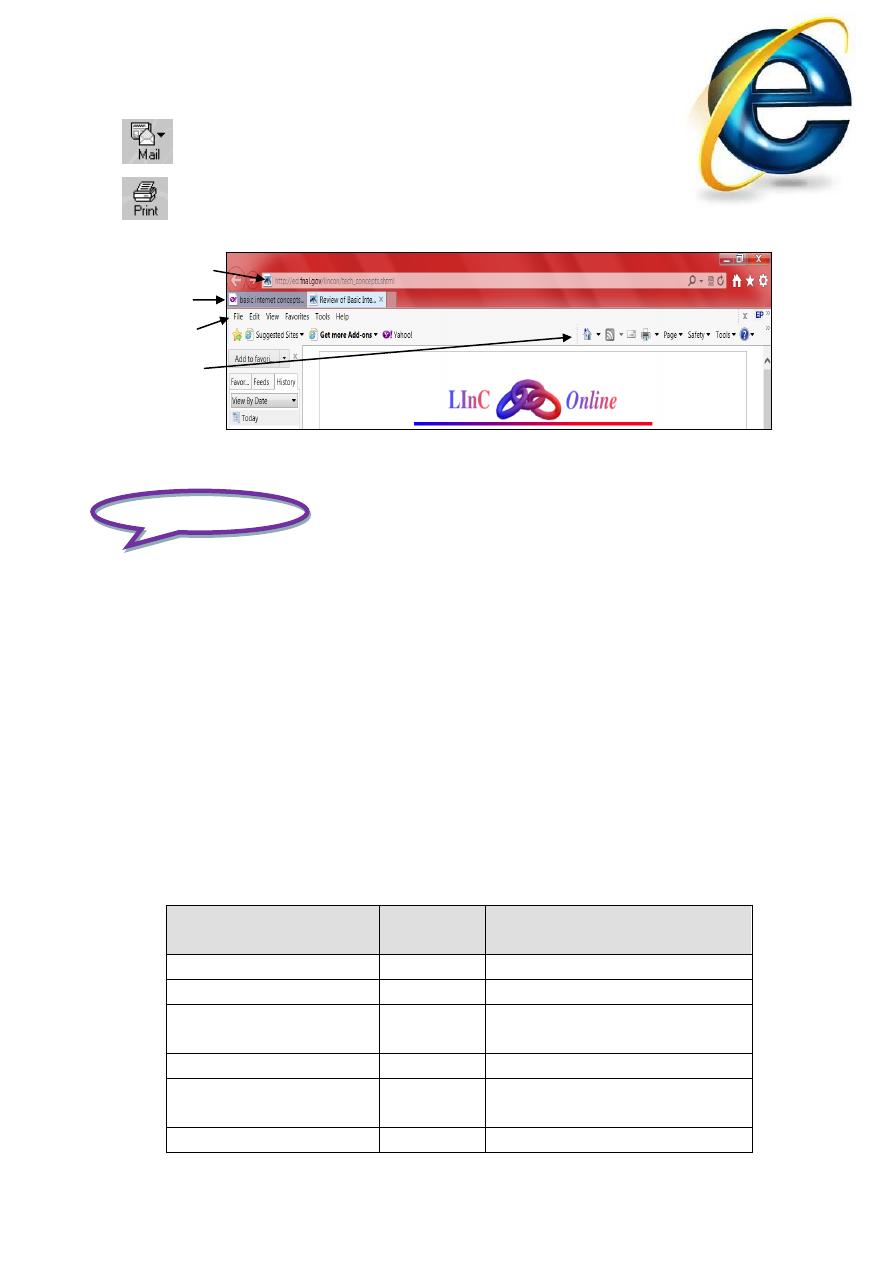
First stage – College of Medicine – University of Mosul \
Nineveh
Computer-Lecture 12 / 2015-2016
Maha al ani
2
Web Addresses
Open your selected email program.
Prints the document you are currently viewing.
Figure (1) the contents of browser window
Every page has its own unique address, known as uniform resource location
URL as shown in figure (2) that is made up of three components:
1. http: hypertext transfer protocol is used to access the Internet and
the other text documents.
2. WWW: World Wide Web.
3. Domain name: location or area where the pages are stored.
4. Top level domain: consist of two parts
The first part contains a three letters code of a URL that indicates
whether the address is a business (.com), a university (.edu) and so
on. See the following table:
Top level domain
name
Extension
الوصف
commercial
.com
شبكة تجارية
organization
.org
منظمة تتبع إحدى المنظمات الدولية
Network
.net
شبكة أو مجموعة تعنى باختصاص
معين
Government
.gov
حكومة
Military
.mil
عسكرية
:
هيئة تتبع إحدى الجهات
العسكرية
educational
.edu
مؤسسة تعليمية
Address bar
Title bar
Menu bar
Tool bar
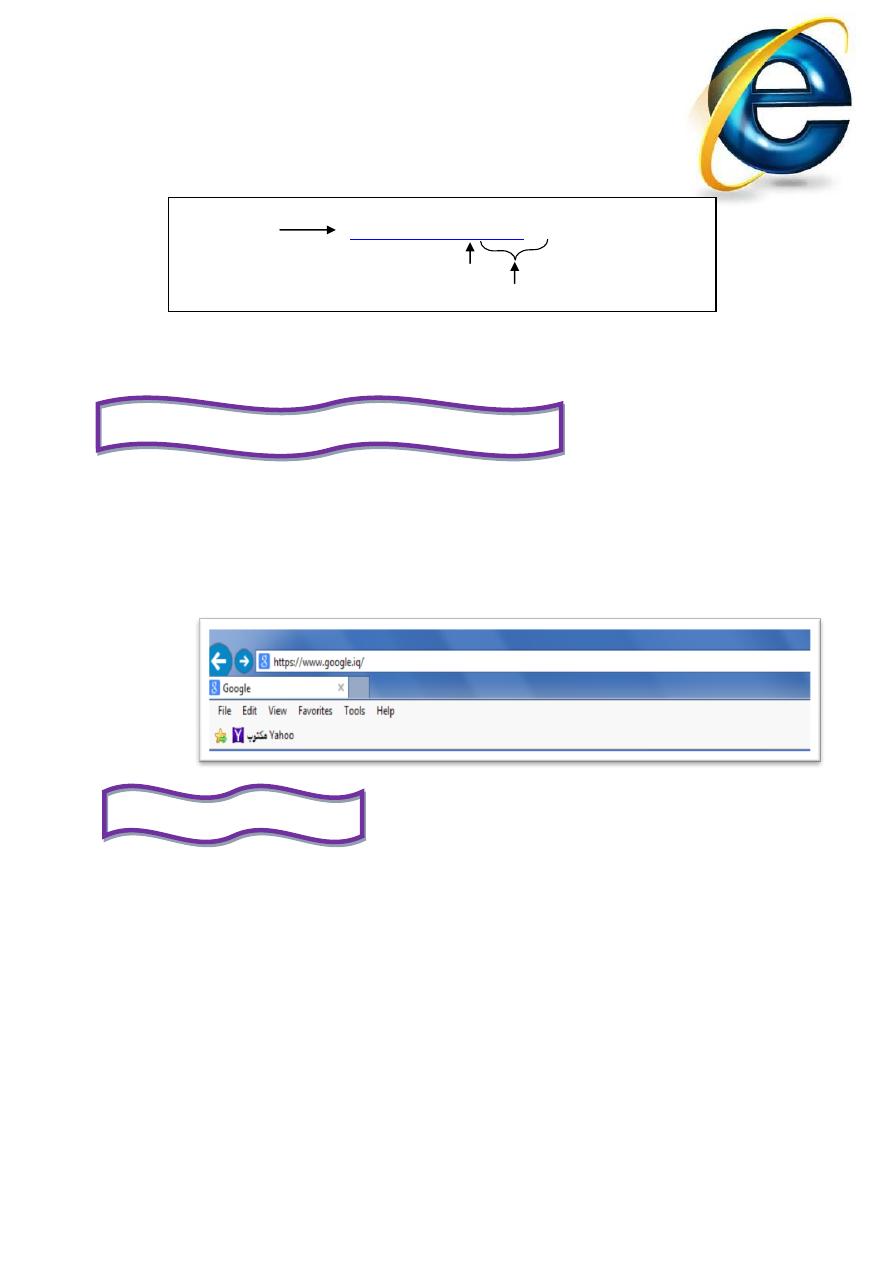
First stage – College of Medicine – University of Mosul \
Nineveh
Computer-Lecture 12 / 2015-2016
Maha al ani
3
The second part contains a tow letters that indicates to
Domain name
Top level domain
Figure (2) an exercise to describe the contents of the web page address
Accessing a Web site by typing its address
Most browsers allow you to access a web site directly by typing its web
address (URL) is the standard addressing system used to locate resources on the
Internet. To access a web site:
1. Click the address box, so that the current address is highlighted.
2. Type the new address.
3. Press the enter key, or click on GO button.
Changing the start page
Your start page is the first web page you will see every time you start the
Internet explorer. So it is a good idea to choose a page that contains
information that is important to you.
Setting a new start page of your choice:
1. Open Internet explorer.
2. Select Internet options from tools menu.
3. Click the General tab as shown
in the right figure.
4. Type the address of the wanted Start page in the address box.
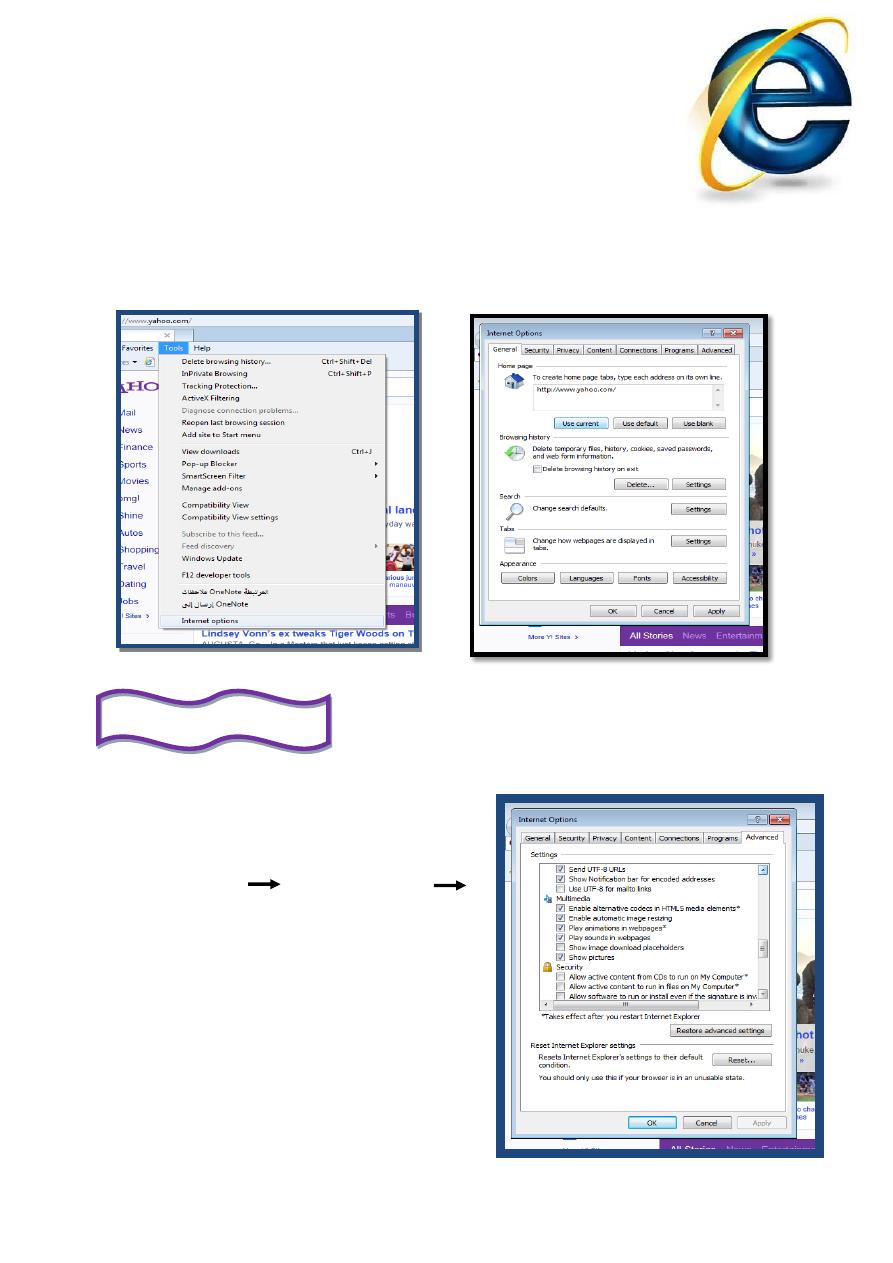
First stage – College of Medicine – University of Mosul \
Nineveh
Computer-Lecture 12 / 2015-2016
Maha al ani
4
5. Click use current button.
6. Click Apply.
7. Click OK.
Once you have changed your start page, you can quickly
view it by clicking the start page button (labeled “Home”) on the standard
tool bar.
Turning off graphics
When you turn off graphics, animations and so on, pages with text only will
download faster.
1. Click advanced tab in the Internet
options window.
Tools bar Internet options
advanced
2. Click to remove the tick from the
following check boxes:
play animation, play sound, play
videos, shows pictures.
3. Click Apply.
4. Click Ok.
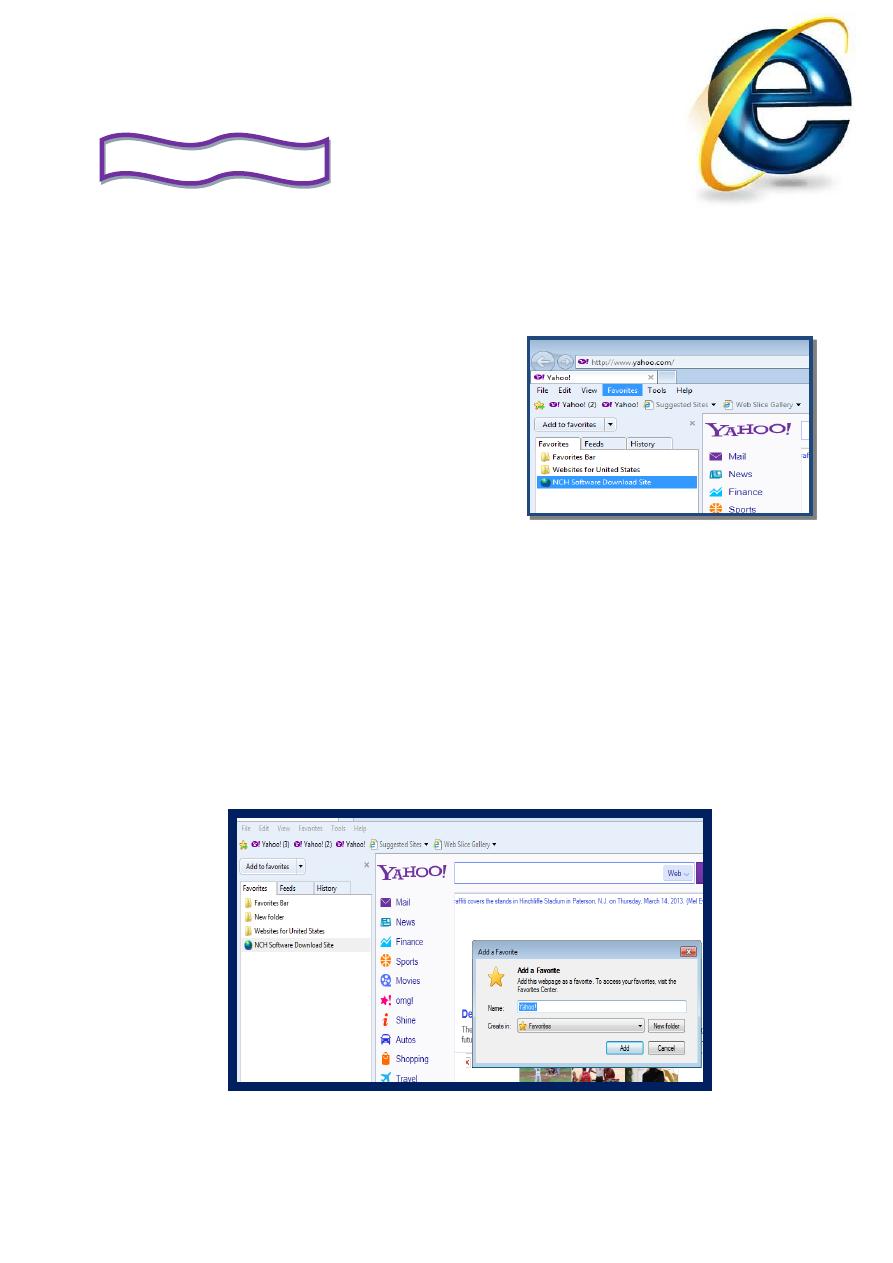
First stage – College of Medicine – University of Mosul \
Nineveh
Computer-Lecture 12 / 2015-2016
Maha al ani
5
Saving Web Address
Internet explorer allows you to easily add a menu item
for any page you are visiting. Once the page’s address is stored, you can
quickly go back to the site at any time by choosing it from the Favorites Menu.
To add a page to your Favorites Menu:
1. Make sure that the address of the page you
want to save is displayed.
2. Click on the Favorite button on the tool
bar, the favorite panel appears at the left of
the browser window.
Figure (1) favorite panel
3. Click on the Add to favorite button at the top of the favorite panel. See
figure (1)
4. Add favorite window opens as in figure (2). Edit the name of the page in
the name box.
5. You can save the address in an existing folder. All favorite folders appear
in the Create In box. As in figure (2).
6. To make any folder, click on the new folder button.
7. Click on the Add button to close add favorite window.
8. Click on X of the favorite panel to close it.
Figure (2) add favorite box
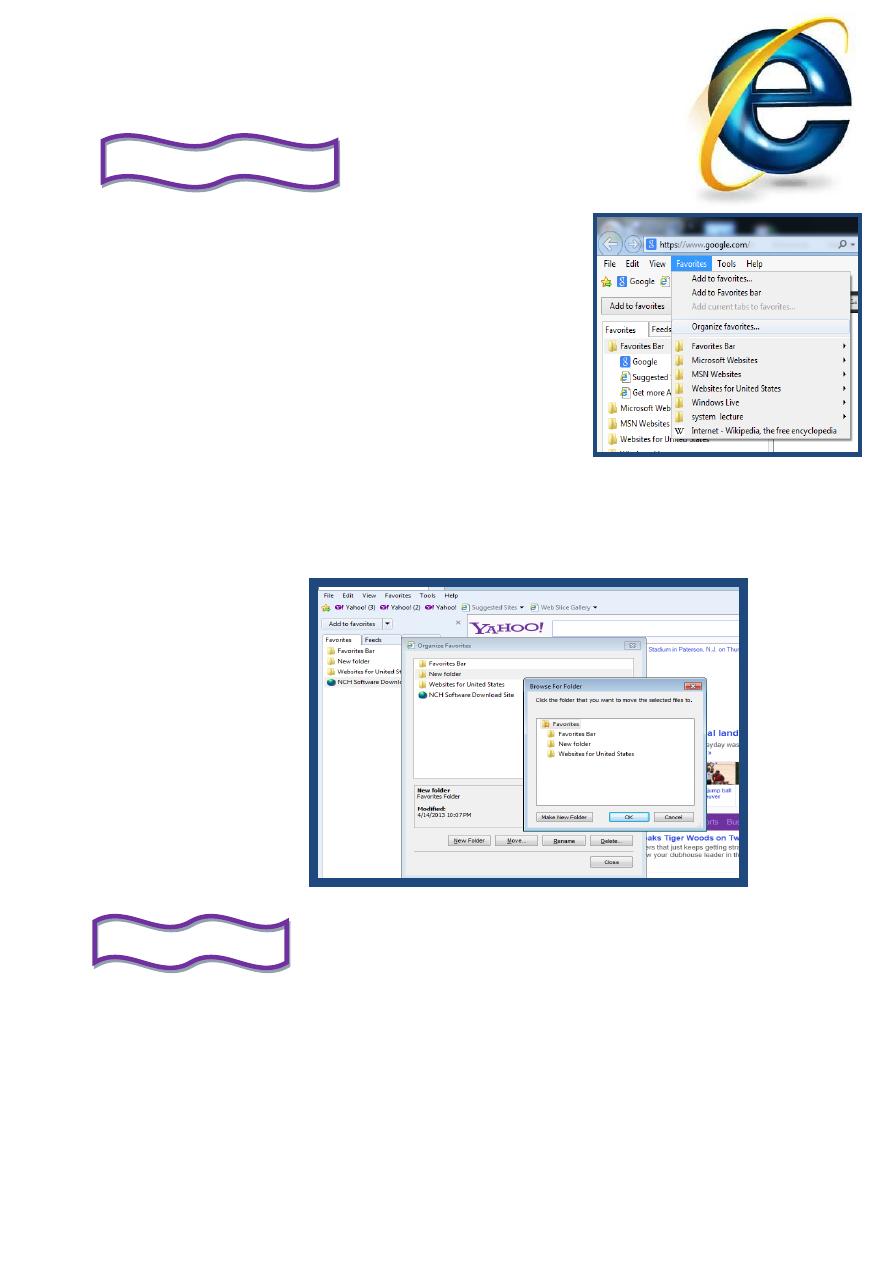
First stage – College of Medicine – University of Mosul \
Nineveh
Computer-Lecture 12 / 2015-2016
Maha al ani
6
Organizing Favorites
By organizing your URL links in the favorite
folder, you can limit the length of the favorite’s pull-
down menu and make it easier to find the URL to the
web site you want to visit.
1. Click on the favorite button on the menu bar, Then
click on the organize favorites. The organize
favorites window opens as in figure (3).
2. Click the favorites (name of page) or a folder to
select it
3. Click on move to folder, the browse for folder window opens as shown
in figure (3)
4. Click on the folder to which you want the selected item to be moved. Or
make new folder to save the favorite page in it.
5. Click OK.
6. Click Close.
Figure (3) organize favorite
Saving Web Pages
You can save the text in a web page to a disk file. You can modify it with
any word processing program. To save a web page for future use, do the
following:
1. Make sure that the page you want to save is displayed on the browser.
2. Select Save As from the File menu, Save Web Page window appears.
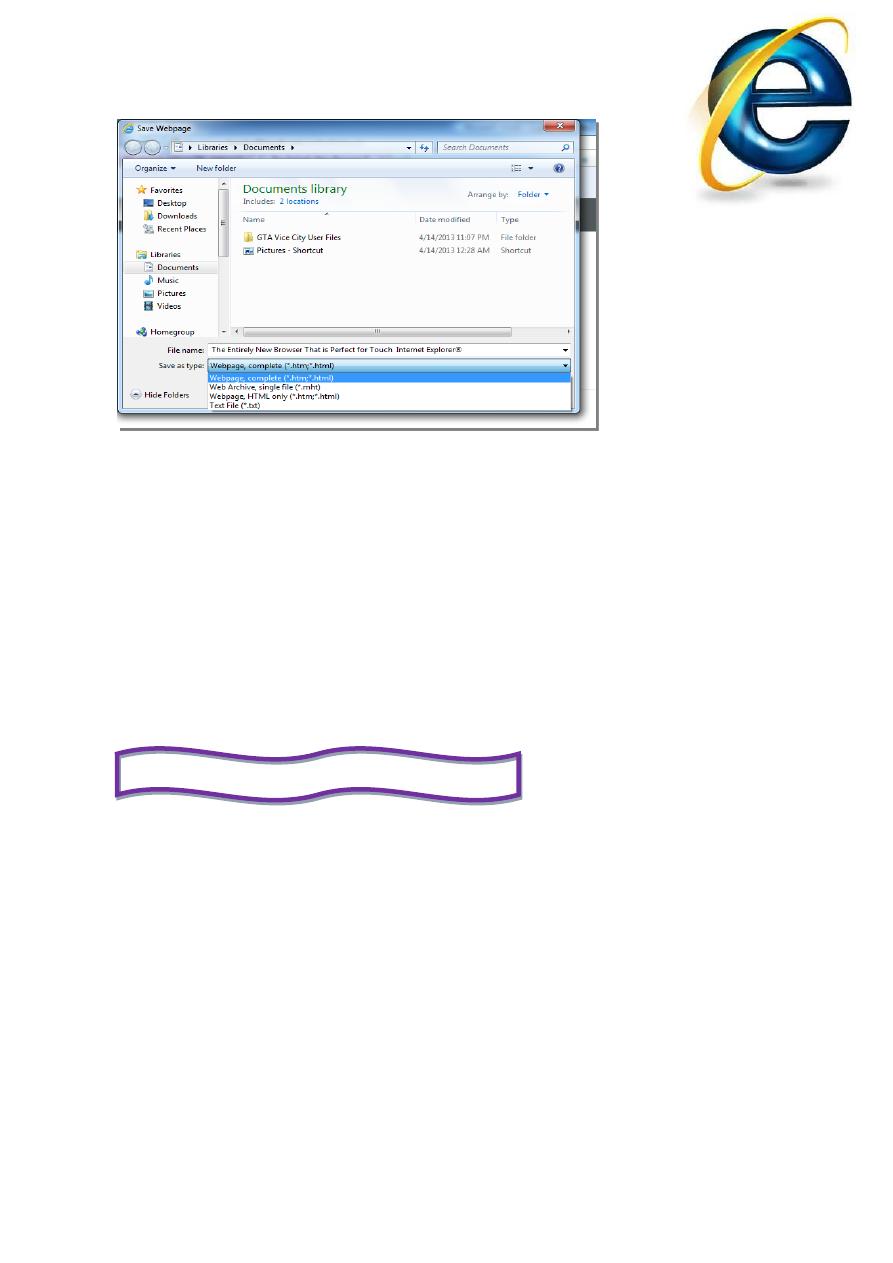
First stage – College of Medicine – University of Mosul \
Nineveh
Computer-Lecture 12 / 2015-2016
Maha al ani
7
3. Select the location in which you want to save the page from the Save in box.
4. Select the type or format in which you want to save the page from Save As
Type list:
Web page complete: to save the whole page but the images are stored
in to different folder.
Web archive for E-mail: save the whole page in one file to be sent by
E-mail.
Html: to save the text only.
Text file: to save the page as plain text.
5. Click on the Save button.
Downloading Files from a Web Page
To download text file, image file, sound file, video file, and software from
a web page to a location on a drive, do the following:
1. Right click on the hyperlink, and from the submenu select Save Target
As.
2. Specify the location where you want to save the file. Then click Save
When you use Internet Explorer to download a file from the Internet, you are
usually asked where you want to store the file. If you don't specify where you
want the file to be stored, Internet Explorer will normally try to put a file in the
most appropriate place. For example, documents and web pages are normally
saved to the Documents folder, music files to the Music folder, and images and
graphics are saved to the Pictures folder. Programs and miscellaneous
downloads are also sometimes saved to the Downloads folder.
